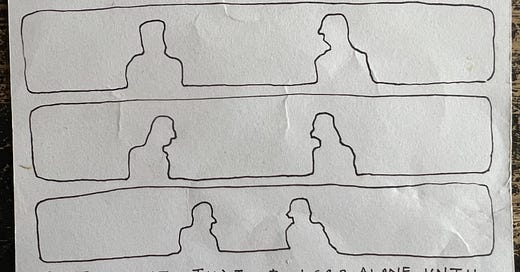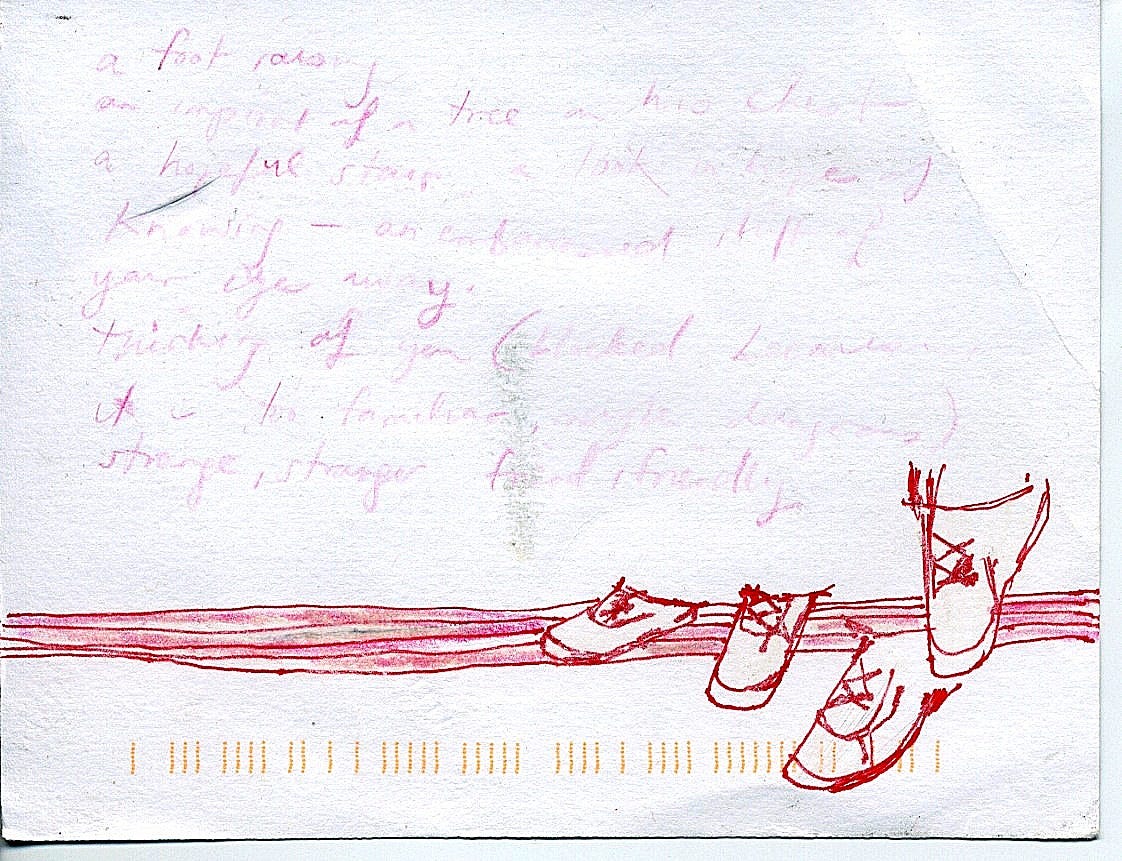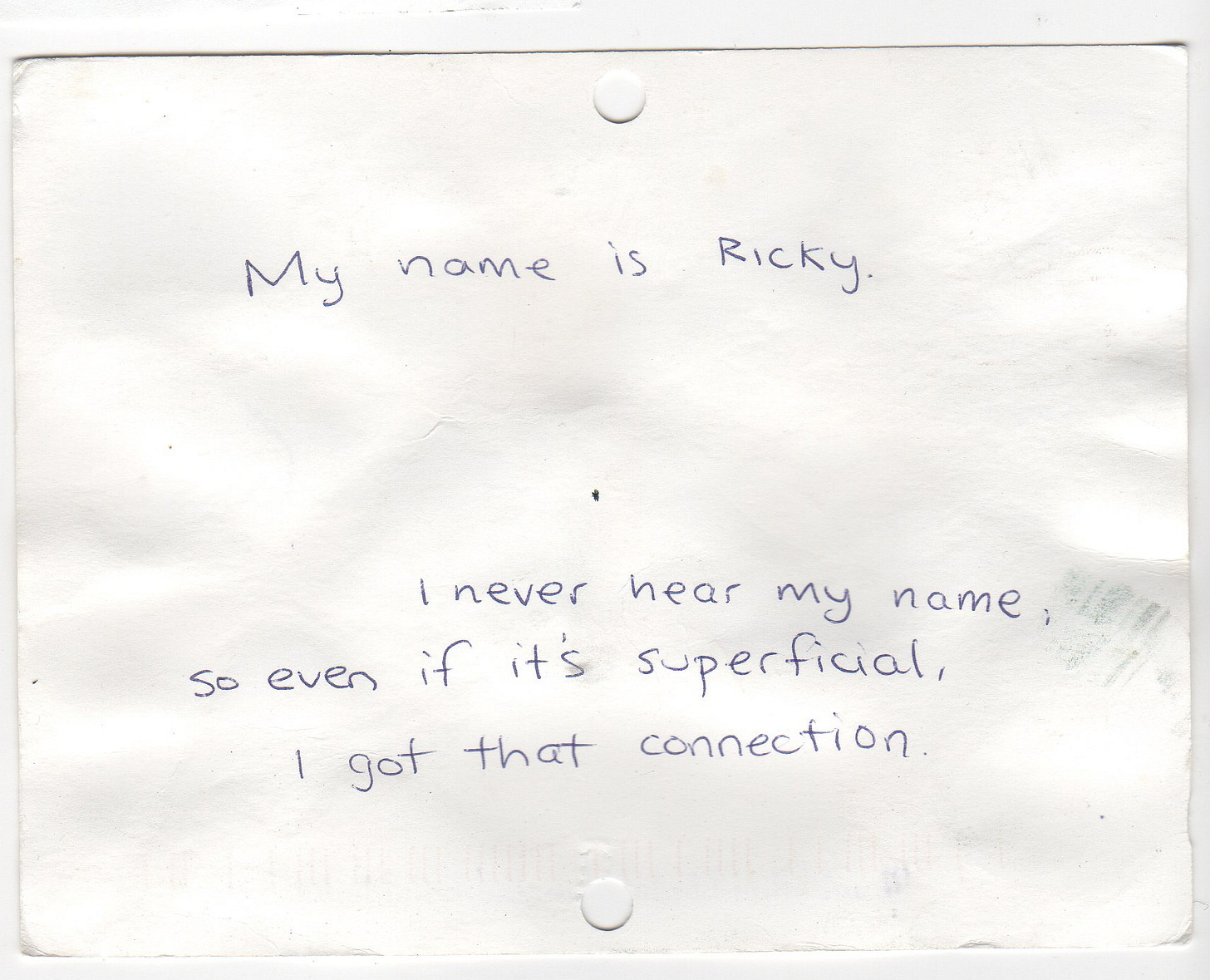notes on "Apprivoiser"
befriending as a process of understanding/understanding as an act of befriending
I recently learned a beautiful French verb recently from a participant in the workshop I’m teaching with Erica Ehrenberg, Nothing is Hidden: Explorations in Buddhist thought, Psychoanalytic and Literature. In discussing the Buddhist concept of emptiness, Nadine Helstroffer invoked the verb, “apprivoiser.” She described it as a process of understanding in which one gently and gradually comes closer to the core of the concept. “To befriend” is how she prefers to translate the verb for these purposes, though she said it can ordinarily carry the sense of “to tame.” She pictured the process as being like two people on a bench gradually moving toward each other.
Nadine’s evocative way of visualizing this verb immediately brought to mind this completely elegant drawing I received from my friend Jim Hollingsworth as a response to a project I was doing at the time when I gave out postcards at poetry readings and asked people to write or draw any memory they had of a poem of mine called “Unseen Planet.”
The project arose from wanting to explore such questions as: How does a poem change in memory? What elements take on particular significance? What gets forgotten, replaced, confounded, or exaggerated? There are times when someone will ask a question like, You know that poem of yours with the bathtub—and I genuinely will not know the poem they’re thinking of because it has somehow changed so thoroughly in their memory.
For a year of so, whenever I gave a reading, I distributed postcards that were blank on one side and on the other was my address and a stamp, along with the request for people to draw or write any memory they had of the poem and then mail the postcard to me. I wasn’t asking for commentary, though a few people offered some, just whatever trace of memory they might have, including, of course, the possibility they might have remembered nothing.
As a reader remembers a poem, a new version of that poem takes shape, and the poem becomes a social being with a life of its own.
What sparked this project was a fascination with the process whereby someone can describe a poem to the person who wrote the poem in a way that the poet cannot recognize their own poem.
Also at the heart of this project is my love for awkward translation. Language that that registers the traces of having passed through another language system evokes in me a highly particular rapture. There’s another kind of translation as poems are carried across not another language, but another person’s memory. So I thought of the postcards as a way to peer into this social translation process. I imagine a version of the poem that somehow contains all of these renderings.
Part of what intrigues me is the way memory incorporates the poem into the listener’s own store of images and associations. In this process, nouns move along trajectories of synonymy and hyponymy, being traded for similar words or more or less specific ones. Also, I was interested in whether there might be some “interference” from other poems I read during the reading, or from other poems in general, both of which happened in a few postcards. I was interested too just in what listeners remembered, even if it didn’t necessarily change in the process. It struck me that a basic principle might be that whatever is animate is what gets remembered. The hawk. The shark. And of course, the cute dog! The poem ends with a “teacup” chihauhua named Kilo, and indeed Kilo showed up on many postcards.
Eyewitness Testimony by Elizabeth Loftus investigates the unreliability of memory as evidence because, among other infidelities, the witness often introduces elements that aren’t there, but that might logically be there based on frames and scripts that come from the person’s world knowledge.
Similarly, a poem supplies an armature of elements from which a reader can build a world, and it’s easy to blur what the reader knows of that world with what is actually “in the poem.” Thus, in one postcard, the poem takes on some stacked blue crates and some fish nets, which would likely be somewhere in the harbor scene, but they’re not in the poem. Or maybe in some very real way, they are in the poem. A post office becomes a Laundromat [places that involve waiting?]; a woman of no specific age becomes an old woman [Is it something about the act of staring that ages her in this reader’s mind? That a younger person would not be looking at the speaker?]
One of the most surprising postcards I received says, “My Name is Ricky. I never hear my name, so even if it’s superficial, I got that connection.” You think someone is going to enter a poem through some rare, subtle, profound affinity a phrase somehow manages to locate, but in this case, it was the simple fact of mentioning this person’s name. Who would have imagined the name Ricky is so rarely uttered? I found this postcard strangely encouraging to think that this very simple unconsidered part of the poem could have actually offered a reader something. The sculptor Elizabeth King once said, about one’s work, whatever work may be, that “you’re always doing more than you think you are.”
“Unseen Planet” investigates how someone moves from stranger to friend. Part of why I chose this poem for the project is that the exchanges that happen in the postcards open a line of communication and connection not usually available after a reading. Usually, you give a reading and maybe you talk to some people afterwards, but generally there’s not much of a chance to hear anything more from the listener. I’ve really enjoyed the way the postcards extend that conversation.
And also, it’s just fun to get mail.
Here’s the poem:
Unseen Planet
All I did was tilt my foot slightly
and the woman across the car stopped
staring. Without even
looking up at her, I could feel her glance
lift, the mass and weight of it, like that ledge
of current you can actually see
when a hawk scrambles up onto an air-
stream. I clear my throat and the man standing
before me clears his, mirror
neurons sparking. Everyone’s a stranger at first,
but by such a narrow margin. Stanley had a theory
about the strangers in my dreams.
In one variation, the stranger sits at the edge
of the bed watching me sleep, but whatever
the stranger does, it is with
a benevolence so thorough, it shocks me
awake. Who was it do you think? Did you recognize
the face? he’d always ask.
The whole point is that they’re strangers, I’d say,
but he had something very specific in mind.
He’d never tell me what.
Next time check the face. Everyone’s a stranger
at first. Who’s next on the docket of strangers
to be bumped up?
Most progress shown in: adjusting to a new situation.
Every time someone comes into this reading room
I expect to know the person
and I look up and it’s someone I’ve never seen. Are
there that many people in town? An exception is
the woman I recognized the second
time she came in and went to the exact same (Dan
Brown) paperback on the spinning rack, picked it up
and then put it back. I want
to sit here until I see someone I know or until the sun
goes down. The only difference between drawing from life
and drawing from the imagination
is the time lapse is shorter. This is one of those quotes
with multiple attributions, like the one that’s either
Nelson Mandela or Marianne
Williamson. One putative source is a painter
whose work I’m not that into, so, having said that,
I won’t mention his name here;
it’s more an indifference than an aversion, but given
that he allegedly said this, I leave more margin
for one day seeing something I haven’t
yet. Difference between a friend and a stranger: one
or two conversations. How many will it take to tip
the spam filter? Unseen planet
creates a wobble. I want to sit here until I see someone
I already know or until the sun sets. At least
on the way here, I saw Ricky.
We might not have even stopped to talk, but we
were both on our bikes riding toward each other
and we kept veering in the same
direction to avoid crashing so finally we just stopped
in the middle of the street. He’d just been out
in the harbor and saw three basking
sharks—-a mother and two young ones. Don’t worry
they only eat plankton, and he wasn’t even swimming–-
though he could have been–-
even in November, he dives in a “dry suit”–-like a wet-
suit, but you can just zip it on right over your regular
clothes. But this time
he was just out on the boat, so even if basking sharks
did have teeth instead of baleen, he’d have been in no
danger. I know most of you
don’t know him, but you could. What is not
going to happen in this poem is that it starts out
remarking benignly on socioneuro-
logical microgestures and then suddenly someone you’ve
just met is getting sheared by a mother shark. You think
you’re all alone and the circulation
librarian says, A book just came in for you before you
hand her your card. I met a young cowboy all dressed
in white linen. You think you’re alone
and the guy who asks for coins–(always coins
instead of change–can you spare some coins?) on Sixth
& Tenth, one morning, tells you,
Girl, I thought you’d never come out of that post office!
My brother has never gotten over the sting
of being spam-filtered. It leaves
a faint imprint, like those stories of people
standing next to a tree when lightning strikes, who
unbutton their shirt and reveal
the outline of the tree on their breast. Unseen
planet creates a wobble. That teacup chihauhua
next door named Kilo, usually
he won’t let anyone pet him, but he really likes you!
To view the suspect message, click this link:
Subject: Thinking of you….











